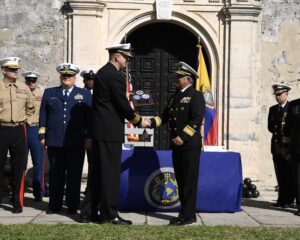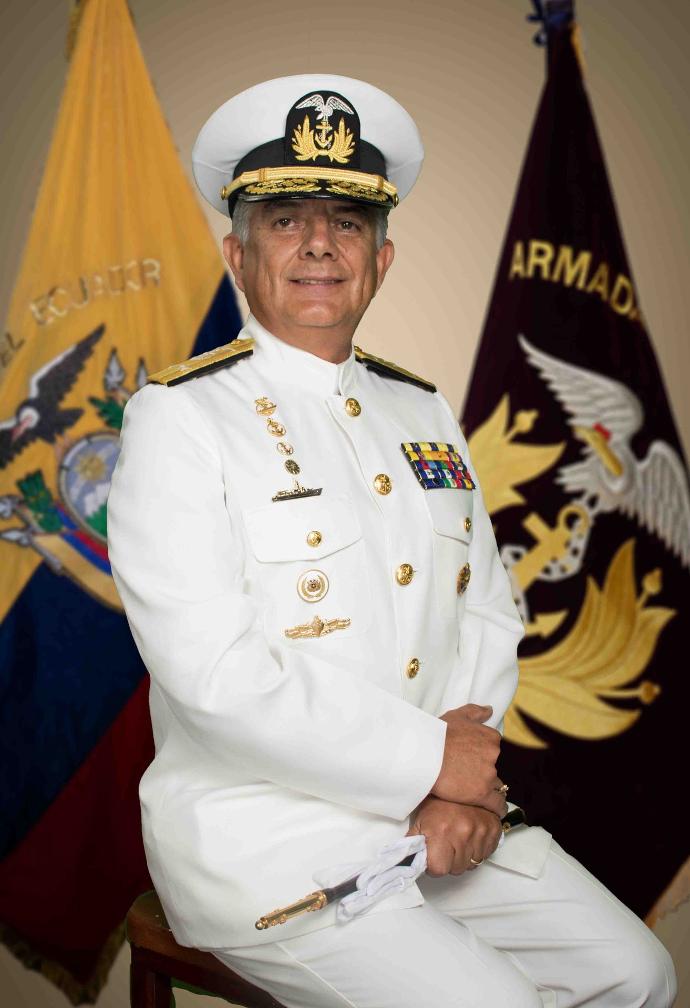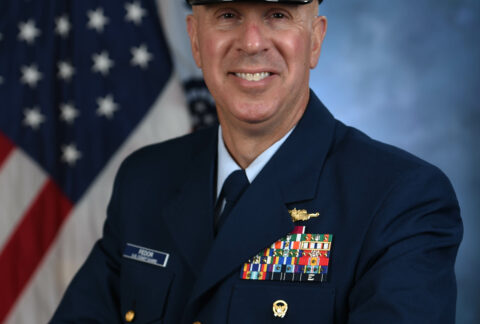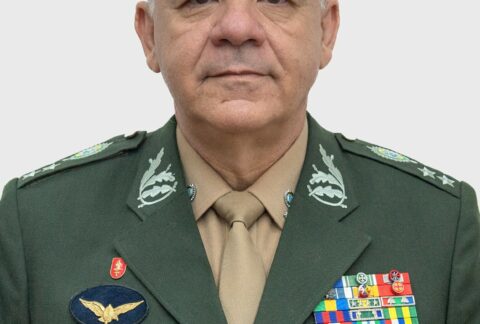Defending Ecuador’s sovereignty, guaranteeing maritime protection, and supporting national maritime development are some of the primary tasks of Rear Admiral Jaime Patricio Vela Erazo, chief of Staff of the Ecuadorian Navy.
Rear Adm. Vela, with 38 years of active military duty, spoke with Diálogo about the importance of national maritime development and the overall security of maritime spaces.
Diálogo: What is your priority as chief of Staff of the Ecuadorian Navy?
Rear Admiral Jaime Patricio Vela Erazo, chief of Staff of the Ecuadorian Navy: Our priority is to achieve a national maritime objective to build the National Maritime Strategy (EMN), in which state institutions related to the country’s maritime development and, consequently, to its maritime security, intervene. The Ecuadorian Navy, as the national maritime authority (NMA) works on the Maritime Security Strategy (ESM) since the Ecuadorian government established narcotrafficking as a threat to national security and illegal, unreported, and unregulated (IUU) fishing as a high risk at the military strategic level. The ESM in turn has plans such as the Security and Protection Plan for Aquatic Spaces and the Plan for the Use of Means at the operational and tactical levels, respectively. All of these plans require an increase in the capabilities of the maritime authority. Therefore, the Navy’s General Staff must harmonize these plans with the Strategic Plan for the Development of Capabilities that the Ecuadorian Navy has.
Diálogo: What were the results of the XXVI Bilateral Meeting of the Joint Chiefs of Staff between the navies of Ecuador and Colombia, held in mid-May?
Rear Adm. Vela: Bilateral relations with the Colombian Navy go back a long way, and the 26th meeting is a demonstration of this with positive results, since we analyzed the issue of combating transnational criminal organizations on the border and the participation of our Navy in the ORION campaigns led by the Colombian Navy, which positions us among the biggest collaborators in operations in support of the Colombian Navy in its fight against narcotrafficking, one of the major problems affecting Ecuador, the region, and the world.
Diálogo: The 17th Basic Naval Intelligence Course began in early May. How does this type of training help naval personnel acquire the skills to carry out intelligence and counterintelligence operations?
Rear Adm. Vela: This course, which is about to end, is of great value for our institution because the nine officers of different specialties, nine crew members, three members of the police, and three from the Attorney General’s Office, have acquired the skills needed to work in a coordinated manner and with the doctrine oriented in intelligence and counterintelligence operations in maritime and coastal areas. Coordinated operations are the best course of action to combat illicit activities at sea in a more effective and efficient manner, since, according to our legislation, our operational bodies, including intelligence, are part of the NMA and can carry out operations in their role as Maritime Police and, if necessary, require the cooperation of the National Police and the prosecutors’ offices of maritime areas.

Diálogo: What are the results of the coordinated actions between the Navy and the National Police to confront crime?
Rear Adm. Vela: The results are excellent; the first and most evident is the increase in seizures of controlled substances and the increase in the number of people apprehended, due to the creation and consolidation of more reliable and rapid means of communication between the two institutions, as well as administrative coordination in the delivery of information aimed at improving the Confidence Test Center, which the Navy will soon be implementing.
Diálogo: Narcotraffickers use the southern corridor of the Galápagos Islands to move drugs to Mexico. What operations do you carry out to interdict go-fast boats that move clandestinely through this corridor?
Rear Adm. Vela: The Ecuadorian Navy permanently monitors the maritime areas under its jurisdiction and that are enshrined in the United Nations (U.N.) Convention on the Law of the Sea and in the Organic Law of Navigation and Security Management. This presence is maintained through satellite monitoring of national and foreign vessels in those areas and with coast guard surveillance units. In addition, we maintain computerized control of the artisanal fuel that is sold in artisanal fishing depots. On the other hand, we carry out combined operations with the United States with excellent results, and we have planned and participated in other types of operations where we positioned a unit with interceptor boats so that, when it has adequate information, it can launch interceptors and capture this type of go-fast boats. Our biggest drawback is the insufficient amount of resources and means, taking into consideration that the Navy employs all available means in these activities, but we have extensive maritime spaces to monitor and control.
Diálogo: In early June 2022, the Ecuadorian government detected some 180 Chinese vessels near the exclusive economic zone (EEZ) of the Galápagos Islands, fishing for giant squid and threatening the biodiversity and economy of the countries of the region. How is the Navy integrated into the national effort to monitor IUU fishing?
Rear Adm. Vela: The foreign fishing fleet that mostly fly the Chinese flag has been present for several years in the deep sea waters off the Galápagos Islands, so much so that in 2017, the Armed Forces through the Ecuadorian Navy, captured one of those vessels that entered the Galápagos Marine Reserve. Since that time, other state institutions observed this problem and the Ministry of Foreign Affairs took action, setting this problem against international efforts and today many countries are part of the initiative to protect living species in this maritime region. Since 2020, with the support of the United States, France, Canada, and the U.N., we have consolidated a monitoring system that allows us to keep up the surface chart to specify what kind of activities are carried out by the foreign fishing fleet and its composition. We have been invited to different forums to speak on the topic of IUU fishing and we are working to ensure that this threat is fought regionally.
Diálogo: How is the Ecuadorian Navy cooperating with its U.S. counterparts?
Contralmte. Vela: The increase in support that we received from the United States is great. U.S. Naval Forces Southern Command/U.S. Fourth Fleet gave great importance to the IV Annual Maritime Staff Dialogue Meeting (MST) held in March 2023, which was a supremely positive message for us. Among the topics agreed upon were the new training that we will receive in our country, so that we can extend them and achieve a better integration. We will also have greater participation with the Kentucky National Guard in the programs that they offer, such as preparation for aircraft maintenance, risk management, particularly in flooding issues, training, including training in combat medicine, and collaboration on leadership issues.
Diálogo: When will multinational exercise GALAPEX take place and what is its purpose?
Rear Adm. Vela: GALAPEX will be carried out September 17-October 1, 2023 in two phases: training and scenario. The overall objective is to strengthen the interoperability of a Multinational Task Force for maritime authority use in Ecuadorian continental and insular jurisdictional maritime spaces, controlled from a Maritime Operations Center in order to contribute to deterring and neutralizing IUU fishing activities.









